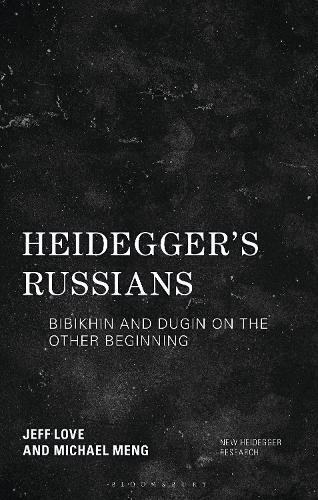
Heidegger's Russians: Bibikhin and Dugin on the Other Beginning
(Hardback)
Publishing Details
Heidegger's Russians: Bibikhin and Dugin on the Other Beginning
By (Author) Michael Meng
By (author) Jeff Love
Bloomsbury Publishing PLC
Rowman & Littlefield Publishers
16th October 2025
United States
Classifications
Professional and Scholarly
Non Fiction
Social and political philosophy
Physical Properties
Hardback
224
Width 152mm, Height 229mm
Description
This book gives a philosophical account of Martin Heideggers influence on two important and hitherto understudied Russian philosophers, Aleksandr Dugin (b. 1962 -) and Vladimir Bibikhin (1938 - 2004).
The book focuses on Heideggers thought as revolutionary and in search of bringing about an other beginning in philosophy and politics. Dugin and Bibikhin are examples of Russian thinkers inspired by Heidegger to consider revolutionary alternatives in the creation of a new beginning for Russia in the wake of the collapse of the Soviet Union in 1991. Dugin represents an attempt to assert the sovereign identity and destiny of Russia and Russian thought as against modern liberal thinking, inspired by the Enlightenment and embodied in the hegemony of the United States, the unipolar tyrant threatening to impose its domination on the world. Bibikhin envisages a different assertion of Russian identity that does not seek direct confrontation with other nations but a transformation in how we may think the political and the destiny of humanity in the modern technological age. If Dugin advocates struggle and a philosophy of chaos that is distinctively Russian in his view, Bibikhin advocates a coming to terms with our brief existence by taking on the burden of mortality, in his words, the burden of the cross. If Dugin advocates recognition of the negative and nothingness, Bibikhin advocates plenitude, a fullness that cannot be exhausted. These Russian thinkers take up major aspects of Heideggers philosophical work; they adapt them in intriguing ways to an extreme existential and political situation whose consequences are still very relevant to the present day, both in terms of Russias influence on the world stage and on the growing turn to the political right that is an international phenomenon of considerable importance.
Reviews
This is a bold and astonishing book. It pulls together two very different Russian philosophers, the humanist Vladimir Bibikhin and the Putin apologist Alexander Dugin, serious Heideggerians who apply the masters legacy on mortality, politics, and metaphysics to reboot a new Russia. A wake-up call for the Western ear too prone to hear only our own fading triumphalist debates. -- Caryl Emerson, A. Watson Armour III University Professor Emerita of Slavic Languages and Literatures, Princeton University, USA
This book offers a provocative and unsettling meditation on what a new beginning in thought might mean today. Drawing on Heideggers later vision of a thinking released from metaphysical closure, it brings into stark relief two radically different Russian appropriations of that legacy: Vladimir Bibikhins gentle reverence for Being and transformative openness, and Alexander Dugins volatile defense of cultural singularity through what he terms a philosophy of chaos. The dialogueat times implicit, at times confrontationalbetween plenitude and void, nonviolence and aggression, resonates far beyond Russias borders. What emerges is a deeply consequential challenge to the intellectual complacency of the West: that our assumptions about universality, reason, and order may themselves be historical accidents rather than philosophical necessities. One may recoil from Dugins polemics or find solace in Bibikhins calm, but neither can be dismissed. This book forces us to confront a world where thought itself should begin againfrom nothing, or from everything. -- Marina F. Bykova, Professor of Philosophy, North Carolina State University, USA
Love and Meng brilliantly take the reader through their original and compelling interpretation of Heideggers revolutionary notion of openness, the violence and criminality against conventional thinking required to attend to it, and the diametrically opposed directions that two Russian thinkers take Heideggers destruction of metaphysics on behalf of the other beginning: the philosophy of chaos of Aleksandr Dugin, Putins philosopher, and Vladimir Bibikhins emancipatory amekhania as joyful exuberance at life. In unfolding the reception of Heidegger by these recent and influential Russian thinkers, the authors place the reader at their crossroads, and ours. -- Henry Pickford, Professor of German Studies, Duke University
Author Bio
Michael Meng is Associate Professor of History at Clemson University. He is the author of Shattered Spaces: Encountering Jewish Ruins in Postwar Germany and Poland (2011) and co-editor of several volumes including Jewish Space in Contemporary Poland (2015) and Rebuilding Jewish Life in Germany (2020). With Jeff Love, he has co-written Revolutionary Bio-Politics from Fedorov to Mao (2023).
Jeff Love is Research Scholar at the Initiative for the Study of Russian Philosophy and Religious Thought, Northwestern University, USA. His books include: Revolutionary Bio-politics from Fedorov to Mao (with Michael Meng) (2023); The Black Circle: A Life of Alexandre Kojve (2018); Tolstoy: A Guide for the Perplexed (2008); The Overcoming of History in War and Peace (2004); and translations of Alexandre Kojves Atheism, F.W.J. Schellings Philosophical Investigations into the Essence of Human Freedom, and Antnio Lobo Antuness Until Stones Become Lighter Than Water.
